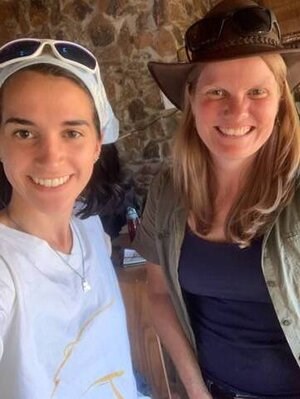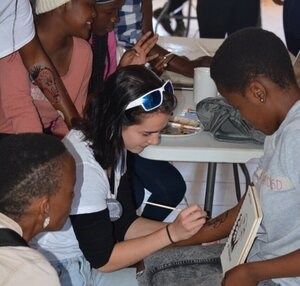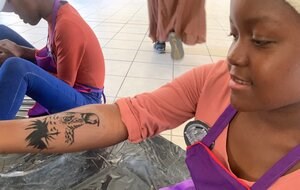Temporary Tattoos for Long-term Conservation
Posted on in In the Field by Jillian Hojsak, Summer 2018 Conservation Science Trainee

I know vultures aren’t the cutest. Despite their negative reputation, vultures are a keystone species; they play a vital role in the ecosystem as a scavenging bird of prey. My summer traineeship at Hawk Mountain in 2018 initially sparked my interest in vultures. I began researching the often-villainized creature and learned of all the risks they face, particularly Old World vultures. Through Hawk Mountain’s international network, I connected and talked with Dr. Lindy Thompson, Project Coordinator for Vulture Conservation and Research at the Endangered Wildlife Trust in South Africa. The more I learned from her, the more invested I became.
One year later, I had the opportunity to travel to South Africa myself! Through Dr. Spelman’s course at the Rhode Island School of Design, I spent three weeks in the Limpopo Province, learning about conservation and current human-wildlife conflicts. The other student artists and I generated projects that communicate or enact a conservation solution to one of the conflicts. We attended lectures regarding elephant, rhino, pangolin, lion, and vulture poaching while simultaneously learning about the local culture. Much to my surprise, our vulture lecturer was Lindy! It was great to officially meet her and speak with her about vultures, especially after the devastating mass poaching event in Botswana, where over 500 vultures were killed via three poisoned elephant carcasses.

My final project highlighted the intensity and personable qualities of South Africa’s vulture species. I created an online quiz for people to determine which species they relate to the most, while informing the participant of the risks that vultures face. I designed six vulture portraits to accompany each species: Cape, bearded, lappet-faced, white-headed, white-backed, and Lindy’s favorite, hooded. The concept began by acknowledging that protecting vultures protects humans. Vultures are a main defense against lethal toxins/diseases like anthrax and rabies. Furthermore, lead bullets used for hunting contaminate our own water and environment, as well as vulture blood.

We presented our projects to high school students in Acornhoek, and it was both successful and inspiring. I painted my designs on the students for three hours straight, after they took the quiz. The act of putting vulture art on our own bodies, even temporarily, symbolizes how poisons affect us as well as them. I enjoyed expanding conversations with each girl, as I painted their selected vultures. It was encouraging to see them become excited about vultures and their individual personality traits. I left South Africa feeling inspired and hopeful that art can have an impact on conservation – even if it’s just for individuals.